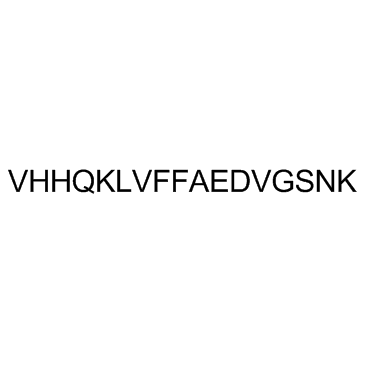107015-83-8
| Name | Amyloid β-Peptide (12-28) (human) |
|---|---|
| Synonyms |
MFCD00133075
vhhqklvffaedvgsnk sp17 amyloid b-protein fragment 12-28 m.w. 1955.20 c89h135n25o25 β-amyloid (12-28) |
| Description | β-amyloid (12-28) is a 17-aa peptide fragment, which can produce amyloid aggregates, used in the research of Alzheimer’sdisease. |
|---|---|
| Related Catalog | |
| Target |
Amyloid-β[1] |
| In Vitro | β-amyloid (12-28) preared freshly in solution has no cytotoxicity, but aged β12-28 peptide (0.001-40 μM) reduces the viability of PC12 cells in a concentration dependent manner[1]. |
| Cell Assay | PC12 pheochromocytoma cell lines are routinely cultured in Dulbecco's modified Eagle's medium containing 10% fetal bovine serum,5% horse serum, 1% glutamine and 1% penicillin/streptomycin. Exponentially growing cellsare plated at 30000 cells per well per 100 µL of fresh medium in 96-well tissue cultures plates. Toxicity assays are carried out by measurementof MTT reduction. Two days after plating PC12 pheochromocytoma cell lines are treated with different concentrations of aged β-amyloid (12-28). After 22 h, MTT (5 mg/mL) wasadded and incubation is continued for a further2 h. Cells are lysed and after 24 h at 37°C,colorimetric determination of MTT reduction is made at 550 nm. Positive controls consist of cells in culture medium. Assay values obtained with these controls are taken as 100% viability[1]. |
| References |
| Molecular Formula | C89H135N25O25 |
|---|---|
| Molecular Weight | 1955.18000 |
| Exact Mass | 1954.01000 |
| PSA | 819.33000 |
| LogP | 2.72410 |
| Storage condition | −20°C |
| WGK Germany | 3 |
|---|
